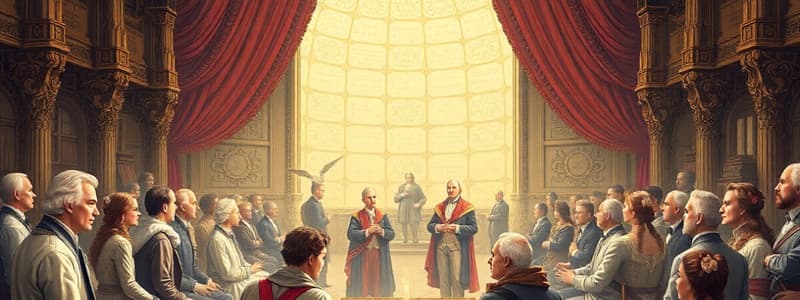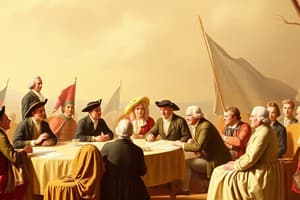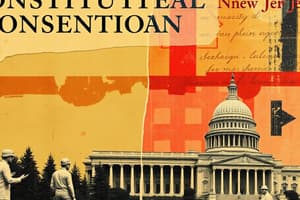Podcast
Questions and Answers
What date did the Constitutional Convention first meet?
What date did the Constitutional Convention first meet?
- August 15, 1787
- July 1, 1787
- May 25, 1787 (correct)
- June 4, 1787
George Washington was elected president of the convention due to his lack of popularity.
George Washington was elected president of the convention due to his lack of popularity.
False (B)
Which state did not attend the Constitutional Convention?
Which state did not attend the Constitutional Convention?
Rhode Island
The oldest delegate at the Constitutional Convention was _____ years old.
The oldest delegate at the Constitutional Convention was _____ years old.
Match the following delegates with their status during the Constitutional Convention:
Match the following delegates with their status during the Constitutional Convention:
What was the average age of the delegates at the Constitutional Convention?
What was the average age of the delegates at the Constitutional Convention?
Thomas Jefferson praised the convention by calling it 'an assembly of demi-gods'.
Thomas Jefferson praised the convention by calling it 'an assembly of demi-gods'.
What role did Benjamin Franklin have at the Constitutional Convention?
What role did Benjamin Franklin have at the Constitutional Convention?
Most delegates had previously served in state _____ or held state office.
Most delegates had previously served in state _____ or held state office.
Which delegates were missing from the convention due to their roles abroad?
Which delegates were missing from the convention due to their roles abroad?
What did Madison write down during the convention?
What did Madison write down during the convention?
The rule of secrecy during the convention was not taken seriously by the delegates.
The rule of secrecy during the convention was not taken seriously by the delegates.
Who is known as the 'Father of the Constitution'?
Who is known as the 'Father of the Constitution'?
The Virginia Plan called for a strong national government with three branches: legislative, executive, and _____
The Virginia Plan called for a strong national government with three branches: legislative, executive, and _____
Match the following plans with their key characteristics:
Match the following plans with their key characteristics:
What was a significant belief held by all delegates at the convention?
What was a significant belief held by all delegates at the convention?
All states allowed unrestricted voting for all citizens after the American Revolution.
All states allowed unrestricted voting for all citizens after the American Revolution.
What did the delegates agree was the purpose of government?
What did the delegates agree was the purpose of government?
The _____ of secrecy was established to allow delegates to speak freely without outside judgment.
The _____ of secrecy was established to allow delegates to speak freely without outside judgment.
What was one major concern among delegates regarding the national government?
What was one major concern among delegates regarding the national government?
Flashcards
Constitutional Convention
Constitutional Convention
The gathering of delegates from 12 states (Rhode Island boycotted) in Philadelphia in 1787 to address weaknesses in the Articles of Confederation and create a new form of government.
Pennsylvania State House
Pennsylvania State House
The building in Philadelphia where the Constitutional Convention took place. It's also known as Independence Hall.
George Washington, President of the Convention
George Washington, President of the Convention
The first action of the Constitutional Convention was to elect George Washington as its president. This is because of his respected leadership and role in the Revolutionary War.
The Delegates
The Delegates
Signup and view all the flashcards
Why Rhode Island Boycotted
Why Rhode Island Boycotted
Signup and view all the flashcards
Revolutionary Leaders Absent
Revolutionary Leaders Absent
Signup and view all the flashcards
James Madison, 'Father of the Constitution'
James Madison, 'Father of the Constitution'
Signup and view all the flashcards
The Average Age and Benjamin Franklin
The Average Age and Benjamin Franklin
Signup and view all the flashcards
Delegates' Experience
Delegates' Experience
Signup and view all the flashcards
Jefferson's Opinion on the Delegates
Jefferson's Opinion on the Delegates
Signup and view all the flashcards
Rule of Secrecy
Rule of Secrecy
Signup and view all the flashcards
Madison's Notes
Madison's Notes
Signup and view all the flashcards
Shared Beliefs & Clashing Views
Shared Beliefs & Clashing Views
Signup and view all the flashcards
Republican Ideals
Republican Ideals
Signup and view all the flashcards
State Representation
State Representation
Signup and view all the flashcards
Virginia Plan
Virginia Plan
Signup and view all the flashcards
New Jersey Plan
New Jersey Plan
Signup and view all the flashcards
New Constitution
New Constitution
Signup and view all the flashcards
Government's Power Source
Government's Power Source
Signup and view all the flashcards
Debates and Challenges
Debates and Challenges
Signup and view all the flashcards
Study Notes
Constitutional Convention Opening
- Convention met May 25, 1787, in Philadelphia's Pennsylvania State House (Independence Hall).
- Delegates elected George Washington president.
- Washington, despite reluctance, played a critical role, presiding and providing prestige.
- 55 delegates from 12 states attended; Rhode Island boycotted the meeting.
- Key revolutionary leaders absent (John Adams, Thomas Jefferson, Sam Adams, John Hancock, Patrick Henry) due to roles in Great Britain and France or concern over strong national government.
- Delegates were well-educated, wealthy, and experienced, with an average age of 42; Benjamin Franklin, at 81, was the oldest.
- Most delegates were lawyers with prior experience in state legislatures and offices.
- James Madison was deemed "Father of the Constitution" due to his extensive preparation and meticulous notes (600+ pages).
- Convention operated under strict secrecy until completion.
- Washington enforced secrecy, highlighting its importance.
Delegate Beliefs and Concerns
- Delegates were united in their commitment to Declaration of Independence principles – "life, liberty, and pursuit of happiness," and "consent of the governed."
- Enlightenment thinkers' ideals on natural law were influential.
- The delegates drew inspiration from American traditions and state constitutions, all of which incorporated republican ideals.
- American's pre-revolutionary history of participation in self-governance (town meetings, colonial bodies).
Convention Issues
- Division on how to represent states in the new government: state vs people power.
- Debate over power allocation to a new government and the extent of its power compared to the states.
- Question of who holds power and representation in government (free, white, male vs other states).
- Differing views on the power of the national government, concerning its role in issues such as liberty and property.
Proposed Plans for Government
- Virginia Plan: Proposed by James Madison, favored stronger national government with three branches and a bicameral legislature (House and Senate) proportionality based on population.
- New Jersey Plan: Proposed by William Paterson, sought to maintain existing structure with a unicameral legislature and equal representation for each state.
Studying That Suits You
Use AI to generate personalized quizzes and flashcards to suit your learning preferences.




